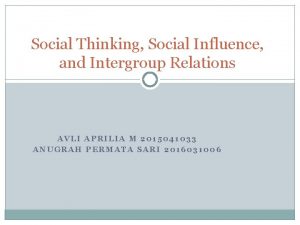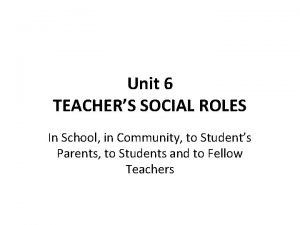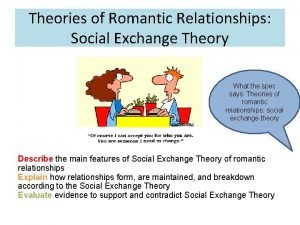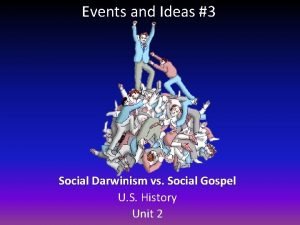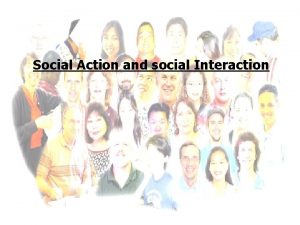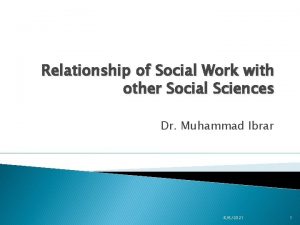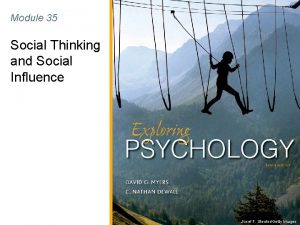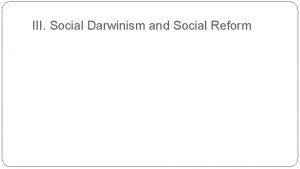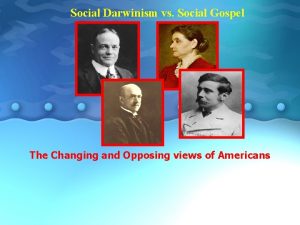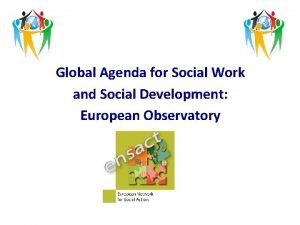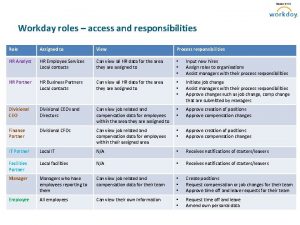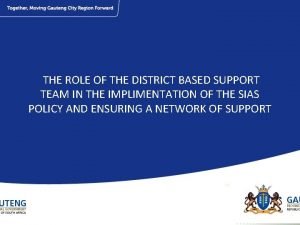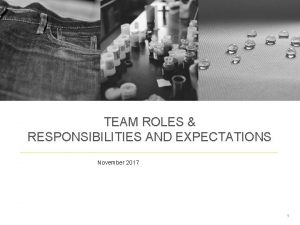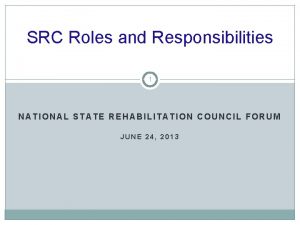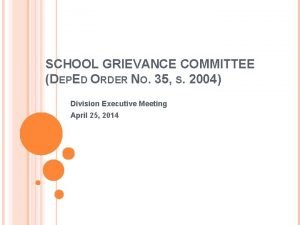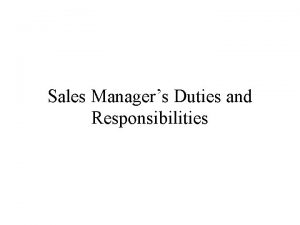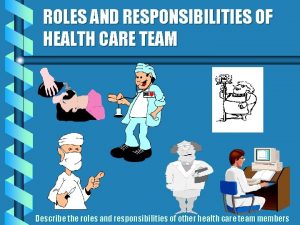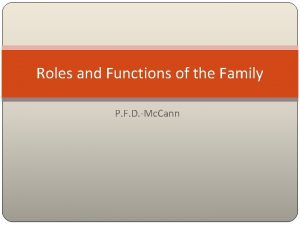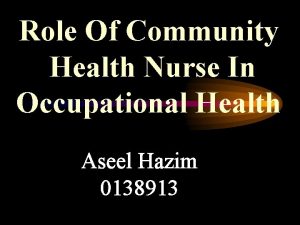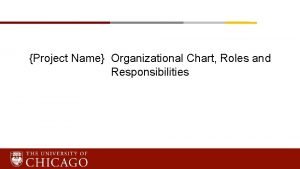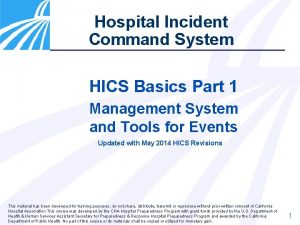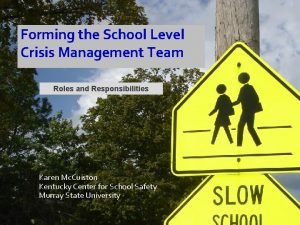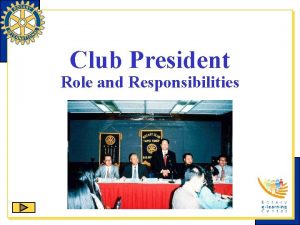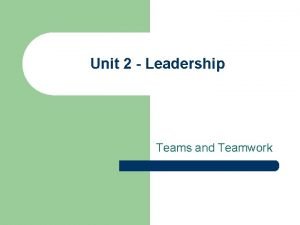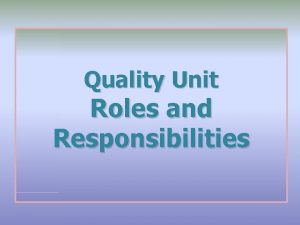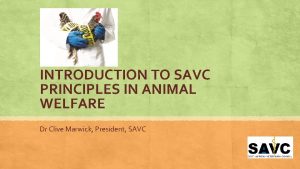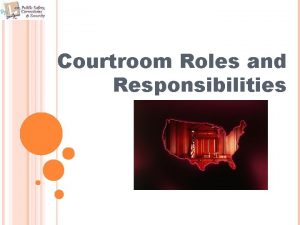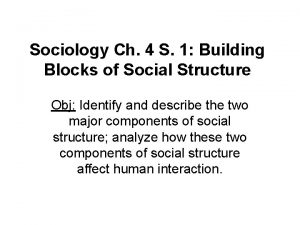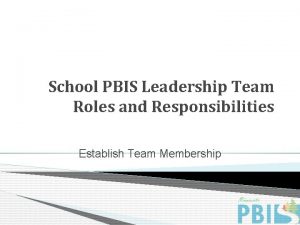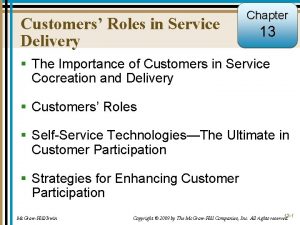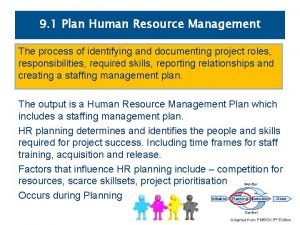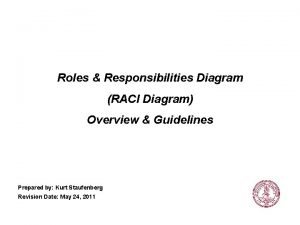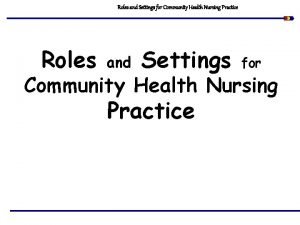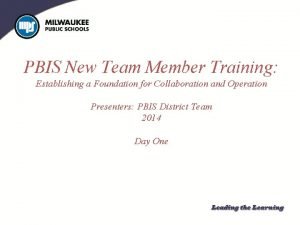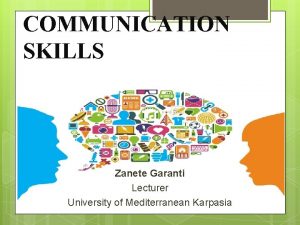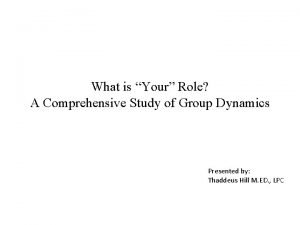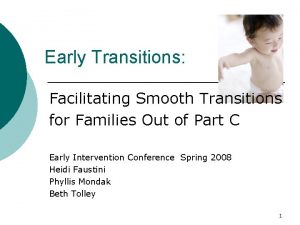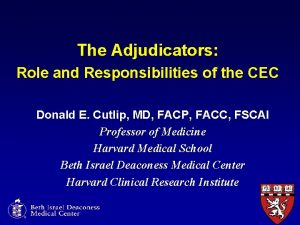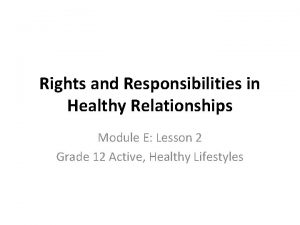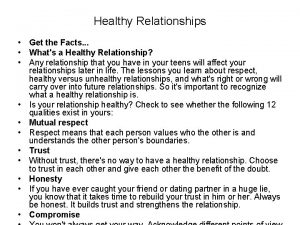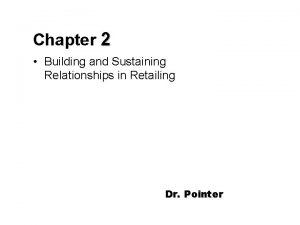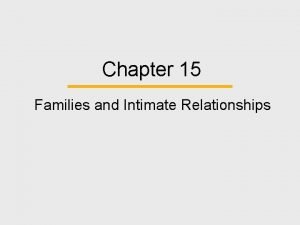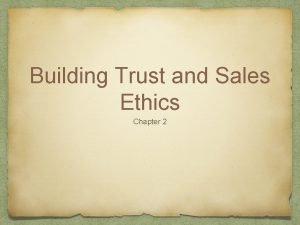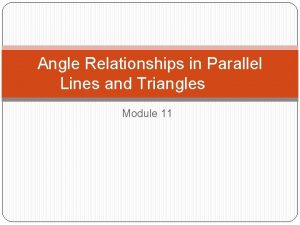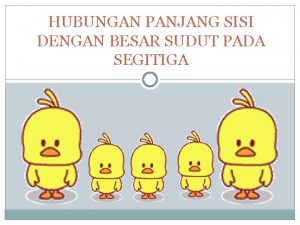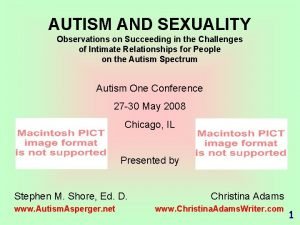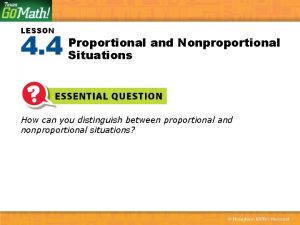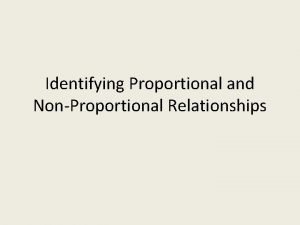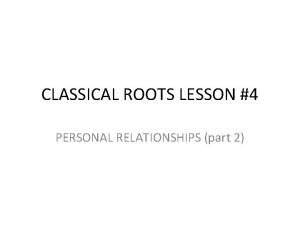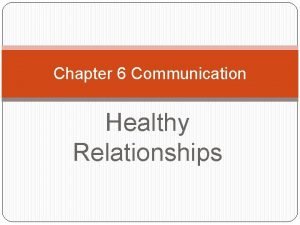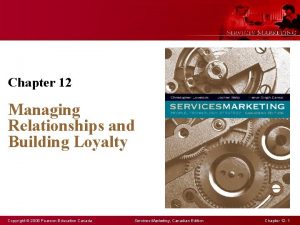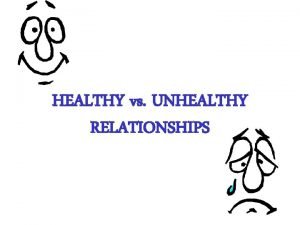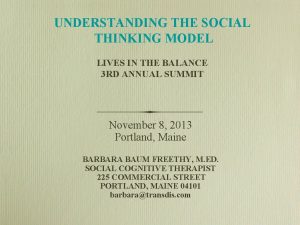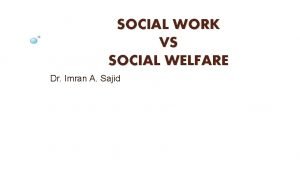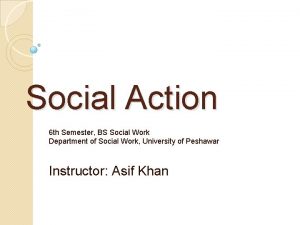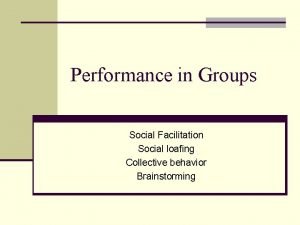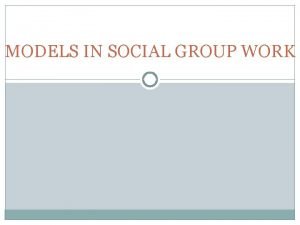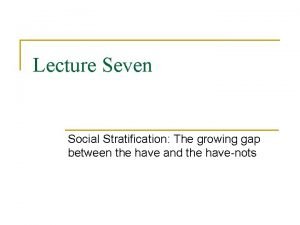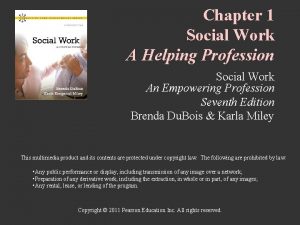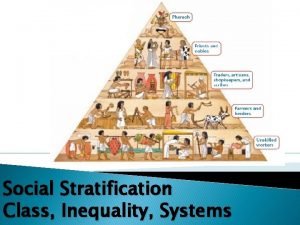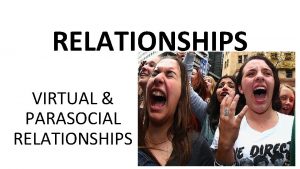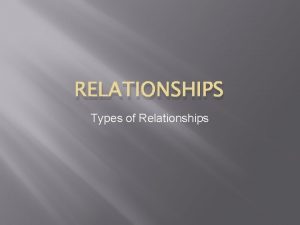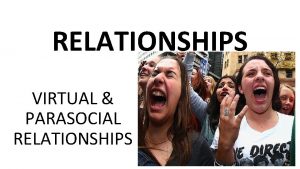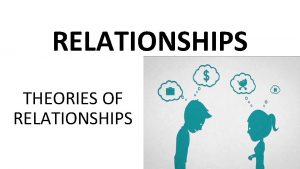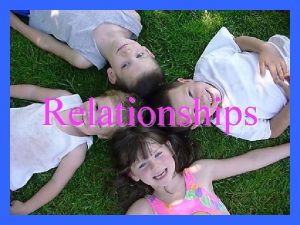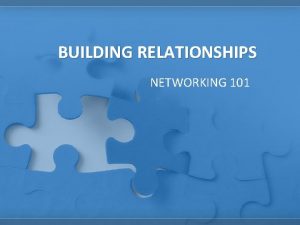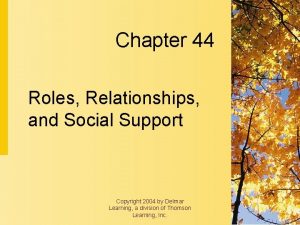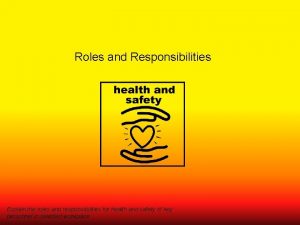Social Roles and Relationships Social Roles and Relationships












































































































































































- Slides: 172

Social Roles and Relationships

Social Roles and Relationships Lesson 1 Introduction to Relationships

I. Man was created as a social being. A. As such man was created with a need for others. 1. We were not meant to exist in isolation on this planet (Gen. 2: 18). 2. We cannot fulfill our God-given destiny without others (Gen. 1: 26 -28). Social Roles and Relationships

3. We all live in relationship to others. a. The word “relationship” refers to state of being connected to others. b. The word “relationship” means “the fact or condition of being related or connected, or that by which things are connected either objectively or in the mind. ” Relationship speaks of interdependence. Social Roles and Relationships

B. As such every man is in some way connected to and interdependent on other people. 1. People are connected. To be connected is to be joined together, associated with or united with (Eph. 4: 16). a. There are many things that can cause us to be connected. b. It is customary to introduce people or to describe ourselves by our relationships or connections. Social Roles and Relationships

2. People are interdependent. To be interdependent is rely on others for maintenance and support. Social Roles and Relationships

C. As such every man’s success depends on maintaining healthy relationships with others (Eccl. 4: 7 -12). When we fully realize this we will be more careful about how we handle the relationships in our life. 1. Sometimes we handle our relationships carelessly as if we they were disposable. Social Roles and Relationships

2. We can do things that weaken our connections to people or we can do things that strengthen them. 3. It is good for us to evaluate just how much we need others. 4. We must guard against an independent spirit that does not appreciate the value that others add to our lives. Social Roles and Relationships

II. Jesus had a lot to say about our relationships. A. He is concerned that we have a love relationship with Him (Mt. 22: 34 -40). B. He is concerned that we have a love relationship with our fellowman (John 13: 34 -35). C. He put a high priority on our being our keeping our relationships pure (Mt. 5: 23 -24). Social Roles and Relationships

III. Satan resists the development of healthy relationships. A. He knows that our relationship to others is a key to our success. B. He does every thing that he can to hinder the development and the maintenance of healthy relationships. 1. He promotes attitudes in us that push people away. Social Roles and Relationships

2. He minimizes how much we really need other people. 3. He fosters misunderstandings and communication breakdown to keep us offended. 4. He leads us to believe that the work involved in cultivating healthy relationships is not worth the effort. Social Roles and Relationships

5. He plants seeds of criticism in our heart toward others. 6. He causes us to be suspicious of others and their motives. Social Roles and Relationships

IV. Modern society hinders the development of healthy relationships. A. People are on the move. B. People are less community orientated. C. People are affected by crime. D. People have been isolated by technology. E. People are more financially independent. F. People have become spectators rather than participants. Social Roles and Relationships

V. Relationships are vitally important if the Church is to fulfill God’s eternal purpose. The Church’s success is based on the right relationship of its membership. This is seen in the various pictures of the Church that are found in the Bible. A. A Body B. A Family Social Roles and Relationships

C. A Temple D. An Army E. A Vine F. A Flock Social Roles and Relationships

VI. God is interested in strengthening us and our relationships for His purpose. A. Our relationship to Him. B. Our relationship to our parents and those older than us. C. Our relationship to our peers. D. Our relationship to the opposite sex. Social Roles and Relationships

Social Roles and Relationships Lesson 2 Relationship to God

I. The Bible clearly teaches that we must seek God first. A. Jesus taught that the first and the greatest commandment is to love the Lord God with all of our heart, soul, mind and strength (Mt. 22: 37 -40). B. Jesus taught that when we put God and His kingdom first the other issues of life will take care of themselves (Mt. 6: 25 -34, esp. verse 33). Social Roles and Relationships

C. Jesus taught that having good works and correct doctrine must be grounded in a first love relationship to God (Rev. 2: 2 -4). Social Roles and Relationships

II. Having a proper relationship with God serves as our foundation for our relationships with one another. We cannot love our neighbor as ourselves unless we first love God with all of our hearts (Mt. 22: 37 -40). A. The “agape” love of God that comes through our personal relationship to God makes it possible for us put off the sin issues in our lives that can have a negative impact on all of our relationships (Eph. 4: 22 -5: 7; Col. 3: 8 -17). Social Roles and Relationships

B. The “agape” love of God that comes through our personal relationship to God makes the dynamics of good relationships possible. Social Roles and Relationships

C. The “agape” love of God that comes through our personal relationship to God makes it possible for all other relationships to succeed. Social Roles and Relationships

D. The “agape” love of God that comes through our personal relationship to God changes the way in which we relate to everyone (John 13: 34). Social Roles and Relationships

III. There are different levels of relationship that we can have with God. The deeper that we allow this relationship to go the more positive affect that it has on all of our other relationships. Social Roles and Relationships

A. A Master/Servant Relationship (John 12: 26; 13: 13) As our Master, 1. He expects obedience to His commands. 2. He expects humble service. 3. He will hold us accountable for what He has placed in our hands. Social Roles and Relationships

B. A Father/Son Relationship (Gal. 4: 6 -7) As our Father, 1. He wants to provide guidance and direction for us. 2. He wants to provide for our natural and spiritual needs. 3. He will faithfully discipline us when we need it. 4. He has laid up an inheritance for us. Social Roles and Relationships

C. A Brother to Brother Relationship (Mt. 12: 49 -50; Heb. 2: 11; Pro. 18: 24) As a brother, 1. He wants to be right by our side in adversity (Pro. 17: 17). 2. He wants to stand with us through our battles. Social Roles and Relationships

D. A Friend to Friend Relationship (John 15: 15) As our friend, 1. He wants to prove or demonstrate His loyalty. 2. He wants to encourage us and lift us up. 3. He wants to share His secrets with us. 4. He wants to sharpen you and make you better than you are now. 5. He wants to have his heart knit together with your heart (Amos 3: 3). Social Roles and Relationships

E. A Husband to Wife Relationship (Eph. 5: 22 -33) As a husband, 1. He wants to prove that He will never leave us or forsake us. 2. He wants to walk hand in hand with us down the path of life. 3. He wants to have intimate communion with us. Social Roles and Relationships

4. He wants to be joined with you for eternity. Social Roles and Relationships

Social Roles and Relationships Lesson 3 Relating to Authority

I. What is authority? Authority is the right to command or act, the right to govern or rule and the right to exercise power. “Authority is the right and capacity of an individual to perform what he wills and who, by virtue of his position or office, can command obedience” (H. D. Mc. Donald, Elwell Evangelical Dictionary) Social Roles and Relationships

II. What is the purpose of authority? God has established authorities in our lives for several reasons. A. Authority has been established by God to help us properly relate to God. B. Authority has been given by God to help us develop wisdom, understanding, knowledge and character (Luke 2: 49 -52). Social Roles and Relationships

C. Authority has been given by God to help to protect us from exploitation (Ps. 91: 1 -13). According to Psalm 91, we are protected because: 1. We are dwelling in the secret place of the Most High. 2. We are abiding under the shadow of the Almighty. 3. We are talking refuge under His wings. 4. We have made the Lord our habitation. Social Roles and Relationships

D. Authority has been given by God to come along side of us to give guidance and direction to the critical decisions of our life (Pro. 6: 20 -23). E. Authority has been established by God to maintain order and to assist us in fulfilling purpose. Social Roles and Relationships

“Everyone is under certain God-ordained authorities, such as parents, government, and the church. The purpose of God-ordained authority is to provide protection, direction, instruction, and provision. ” –Bill Gothard Social Roles and Relationships

III. What authorities must I relate to as a Christian? A. Absolute Authority 1. God created the world and everything in it. 2. God owns the earth and everything in it. 3. God has given life to everything that lives. 4. God sustains the earth and everything in it by His word. Social Roles and Relationships

B. Delegated Authorities God has delegated His authority on the earth to human channels. God fully expects us to respond to these channels of His authority the same way that we would respond to Him. There are five levels of delegated authority. 1. God has delegated authority to the individual to rule over his or her own soul (Pro. 4: 23). Social Roles and Relationships

2. God has delegated authority to the natural family. a. There is authority carried by the parents together. b. There is additional authority carried by the husband father. Social Roles and Relationships

3. God has delegated authority in the realm of civil government. a. We are commanded to be subject to the higher powers and give honor to whom honor is due. b. We are commanded to honor the king. Social Roles and Relationships

4. God has delegated authority in the local church. 5. God wants us to respond to the authority structure related to our work life. Social Roles and Relationships

IV. What does biblical submission to authority look like? A. Submission is coming under the spiritual covering of those appointed over you from the heart. B. Submission involves obeying your authorities in spirit and in truth. Social Roles and Relationships

C. Submission involves responding to your authorities as you would to Christ Himself. D. Submission automatically involves a certain level of accountability and the concept of stewardship. Social Roles and Relationships

V. How does Satan promote rebellion to authority? Satan knows that our success as individuals and our success as local churches is based on effective leadership. Satan is against authority because he knows that without effective leadership the church will not be built and our lives will not reach their intended destination (Eph. 4: 7 -16). For this reason God puts the sin of rebellion on the same level as “witchcraft”. Social Roles and Relationships

A. He fosters an independent spirit in us. B. He promotes attitudes that conflict with authority. C. He promotes misunderstandings and offenses between us and our authorities. D. He tries to convince us that our authorities do not understand us and they do not have our best interest in mind. Social Roles and Relationships

E. He creates an atmosphere of suspicion relative to our authorities. F. He convinces us that we are free from authorities that do not live up to our standards of righteousness G. He plants seeds of disloyalty in our hearts that can lead to a casting off of our authorities. H. He prompts us to speak to others of things that undermine the value of authority. Social Roles and Relationships

II. What are the limits of authority? All delegated authority has its limits. Ultimately we must obey God above all other delegated authorities (Acts 5: 29). When any authority on earth asks us to violate the clear word of God, we will have to disobey that authority. However, we can still disobey with a submissive and respectful attitude toward that person. Social Roles and Relationships

“The only circumstance that disobedience to authority is justifiable by scripture is if it conflicts with the laws of God. Authority should be cooperated with except in those situations where laws depart from the basic moral and righteous principles of God’s Word. ” –Dr. Dale A. Robbins Social Roles and Relationships

III. How do I restore proper relationship to God’s delegated authorities in my life? A. Take personal responsibility for closing the gap between you and the authority figures in your life. 1. Repent for wrong attitudes against authority. 2. Pray for those in authority. 3. Forgive those in authority. Social Roles and Relationships

4. Open fresh lines of communication. 5. Apologize for past attitudes. 6. Ask God for creative solutions for old problems. 7. Seek input from your authorities. Social Roles and Relationships

B. Work through each of the authority relationships in your life beginning with your parents. Social Roles and Relationships

Social Roles and Relationships Lesson 4 Relating to the Body of Christ

I. What happens when we become part of the family of God? When God calls us into the family of God He calls us into relationship with others. In the family of God we have relationship to the following: a. We have a relationship to our Heavenly Father. Social Roles and Relationships

1. As a true father God has provided the seed that has brought about our birth into the family of God. 2. As a true father God has provided an inheritance for His offspring. He has laid up for their future. 3. As a true father God is responsible to discipline us when we need it. Social Roles and Relationships

B. We have a relationship to an elder brother. In the Church we have an elder brother, the Lord Jesus Christ (Heb. 2: 14 -17). 1. Christ is the unique Son over His own house. 2. He is the firstborn and pattern son in the family. Social Roles and Relationships

3. He is our kinsman redeemer who has paid the price to restore our lost inheritance. 4. He is our example, the one who has gone before us and the on whom we can rely as we go through all of life’s problems. Social Roles and Relationships

C. We have a relationship to fellow brothers and sisters. In the Church all true believers are the children of the family. 1. As members of the family we are all partakers of the same blood (John 6: 53). Social Roles and Relationships

2. As members of the family we all take on the family name. 3. As members of the family we all bear the family resemblance or image. 4. As children of the family we must fulfill all the duties and responsibilities of brothers and sisters which are outlined in the Word of God. Social Roles and Relationships

II. How does Paul demonstrate a good example of brother and sister relationship? A. Paul didn’t see people as problems; he had a genuine love for others. 1. Paul always referred to others as “beloved”. Social Roles and Relationships

2. Paul wasn’t afraid to get close to people and get emotionally involved with them. 3. Paul even had a genuine love for those he had not seen. Social Roles and Relationships

B. Paul realized a dependence on others; he knew he was not self-sufficient. 1. Paul always had something good to say about people. He did not neglect to compliment them on their strengths. Social Roles and Relationships

2. Paul never failed to exalt and acknowledge support ministries even though their role may have been minor. 3. Paul depended on the prayer of others. 4. Paul never took others for granted, but was always thankful for their contribution to his ministry, and he was faithful to tell them. Social Roles and Relationships

C. Paul lived and poured out his life for others. 1. Paul spent time in prayer for others. 2. Paul was willing to make financial sacrifices for others. 3. Paul made most decisions in his life on the basis of how it would affect others. Social Roles and Relationships

D. Paul was very much concerned about seeing others realize their full potential in God. 1. Paul had confidence in others. 2. Paul was not afraid to get specific with people if it would help them. Social Roles and Relationships

III. What serves as the basis for brother and sister relationship in the Body of Christ? Brother and sister relationships are based on the “agape” love of God. A. There at least four different types of love that were part of Greek culture. Unfortunately in English we only have one word for “love. ” Social Roles and Relationships

1. There is erotic love (eros). 2. There is friendship love (philos). 3. There is family love (sterge). 4. There is God-like love (agape) Social Roles and Relationships

B. God wants to birth a deep level of love in His body. We are commanded to love in the following ways: 1. With a pure heart. 2. With unfeigned or sincere love. 3. With brotherly love. 4. With fervency. 5. With abounding love. Social Roles and Relationships

IV. Brother and sister relationships are mutually uplifting or edifying. A. These relationships should involve building each other spiritually. This involves: 1. Stirring one another up. 2. Encouraging or exhorting one another. 3. Comforting one another. 4. Building up one another. 5. Praying for one another. 6. Bearing each other’s burdens. . 7. Teaching and admonishing one another. Social Roles and Relationships

B. These relationships should involve caring for each other naturally. 1. Serving and sacrificing for others. 2. Meeting the practical needs of others. 3. Ministering to others financially. 4. Exchanging of skills with others. 5. Rushing to the “emergency” needs of others. 6. Showing hospitality to others. 7. Doing good to others. Social Roles and Relationships

C. These relationships should involve spending time with each other socially. 1. Eating together. 2. Thinking together. 3. Rejoicing together. Social Roles and Relationships

Social Roles and Relationships Lesson 5 -7 Cultivating Friendship

I. What is a friend? A. The dictionary defines a friend as “one who cherishes kind regard for another person; an intimate and trustworthy companion. ” B. There are other definitions that have been put forward for a friend. Social Roles and Relationships

1. A friend is someone with whom you dare to be yourself (C. Raymond Beran). 2. A friend is someone who understands your past, believes in your future, and accepts you today just the way you are (Unknown). 3. A friend is one who knows all about you and likes you just the same (Elbert Hubbard). 4. A friend is a person with whom I may think out loud (Ralph Waldo Emerson). Social Roles and Relationships

5. A real friend is one who warms you by his presence, trusts you with his secrets, and remembers you in his prayers (Unknown). 6. A friend is: • A push when you have stopped. • A word when you are lonely. • A guide when you are searching. • A smile when you are sad. • A song when you are glad. –Unknown Social Roles and Relationships

II. What are the various levels of friendship? There at least four levels of friendship or relationship: Social Roles and Relationships

A. Acquaintance 1. The word “acquaintance” is defined as follows: “A person with whom you are familiar or conversant. ” 2. An acquaintance is someone that you see occasionally, that you know on a very surface or public level and that you can identify by name and general information. Social Roles and Relationships

B. Casual Friends 1. The word “casual” is defined as follows: “Occurring at irregular intervals, accidentally or by chance. ” 2. A casual friend is someone with whom you share common interests and with whom you participate in common activities. You bump into them occasionally, more by chance than by design. You may know very little about them except for those commonly shared areas or experiences. Social Roles and Relationships

C. Close Friends 1. The word “close” is defined as follows: “Affectionately associated with or trusted. ” 2. A close friend is someone with whom you share common life goals, mutual projects and personal conversations relative to family, values and beliefs. A close friend is someone that you trust and toward whom you feel a strong level of personal commitment. Social Roles and Relationships

D. Intimate Friends 1. The word “intimate” is defined as: “Closely connected on a personal, confidential and innermost level. ” 2. An intimate friend is reserved for only the very closest of friends and is based on covenant relationship. This includes a mutual commitment to build each other up, to love in spite of weaknesses and to sharpen character through personal accountability. Social Roles and Relationships

III. What is the purpose of friendship? A. A person who has no friends is missing out on some of the greatest blessing of life (Ps. 142: 1 -4). This verse teaches that: 1. A person without friends has no one to whom to tell his troubles. Social Roles and Relationships

2. A person without friends has no one to turn to when he is overwhelmed. 3. A person without friends has no one to protect his back when enemies come against him. 4. A person without friends has no one to help him when he needs help. 5. A person without friends has no one to care for him spontaneously. Social Roles and Relationships

B. A person who has friends is blessed (Eccl. 4: 9 -12). This verse teaches that: 1. A person who has friends has someone with whom to share in his or her labor. 2. A person who has friends has someone to lift him up when he falls. Social Roles and Relationships

3. A person who has friends has someone to bring warmth to his or her life. 4. A person who has friends has someone to help him or her overcome obstacles. Social Roles and Relationships

C. A friend is someone who can refresh our souls. 1. By sharing their life with us in fellowship and relationship. 2. By caring for us in our times of difficulty. 3. By growing with us in the purposes of God through mutual edification and accountability. Social Roles and Relationships

IV. What does the Bible teach us about friendship? A. The Book of Proverbs has much to say about friendship. 1. True friendships in life are few in number. “A friend to everybody and to nobody is the same thing” –Spanish Proverb “He who has many friends, has none. ” –Aristotle (384 -322 B. C. ) Social Roles and Relationships

2. A true friend stands with you in times of trouble (Pro. 17: 17). 3. A true friend is not in the relationship for the wrong reasons (Pro. 19: 4, 6). 4. A true friend’s counsel is very sweet (Pro. 27: 9). 5. A true friend will tell you what you need to hear not what you want to hear (Pro. 27: 5 -6). Social Roles and Relationships

6. A true friend will clash with you at times for your personal improvement (Pro. 27: 17). 7. A true friend is loyal at all times (Pro. 11: 13; 17: 17; 18: 24, NLT). 8. A true friendship can be destroyed by slander, whispering and not keeping confidences (Pro. 16: 28; 17: 9). Social Roles and Relationships

B. Jesus had something to say about friendship. 1. A friend lays his life down for the relationship (John 15: 13). 2. A friend knows the real you (John 15: 15). Social Roles and Relationships

C. The rest of the Bible adds to the concept of friendship. 1. A true friend will know you as they know themselves (Deut. 13: 6 b). 2. A true friend will show you kindness when you are discouraged (Job 6: 14, NIV). Social Roles and Relationships

3. A true friend will be an advocate or intercessor to plead your cause (Job 16: 21, NIV). 4. A true friend will be there to restore you when you stumble (Eccl. 4: 10). Social Roles and Relationships

V. How do friendships happen? A. Friendships must be desired. B. Friendships must be pursued. C. Friendships have to be built. Social Roles and Relationships

D. Friendships take time to build. E. Friendships will be tested. F. Friendships must be maintained. G. Friendships are to be enjoyed. Social Roles and Relationships

VI. What are some qualities to look for in a friend? Quotes: “Friendships form among people who strengthen each other. ” –Franklin Owen “He who looks for advantage out of friendship strips it of all its nobility. ”–Seneca (4 B. C. -65 A. D. ) Social Roles and Relationships

Here are five key qualities that you look for in friends. A. Those who fear the Lord. B. Those who can keep confidence. C. Those who possess the fruit of the Spirit. D. Those who enjoy life. E. Those who share your basic values. Social Roles and Relationships

VII. What are some qualities to avoid in a friend? We must choose our friends wisely because we will be known by our friends or the company we keep (Pro. 12: 26; 13: 20; I Cor. 15: 33; Ps. 106: 19 -20). Here are five key qualities that you do not want in your friends. Social Roles and Relationships

A. Angry or Hot-tempered People B. Worldly People C. Wicked People D. Self-Centered People E. Hypocritical, Unrepentant “Christian” People Social Roles and Relationships

VIII. What are some skills that will help you to develop and foster good friendships? Quotes: “Friendship is like money, easier made than kept. ” –Samuel Butler (1612 -1680) “Promises may get friends, but it is performance that must nurse and keep them. ” – Owen Fellthan (1602 -1668) Social Roles and Relationships

“Friendship is usually treated as a tough and everlasting thing which will survive all manner of bad treatment. But it may die in an hour of a single unwise word; its conditions of existence are that it should be dealt with delicately and tenderly. It is a plant and not a roadside thistle. We must not expect our friend to be above humanity. ” –Ouida (1839 -1908) Social Roles and Relationships

A. Becoming a good conversationalist. 1. Learn how to start a conversation and keep it going. 2. Be willing to give and to receive information. 3. Do things together that require a certain amount of talking. 4. Learn how to communicate creatively to further feed the friendship. Social Roles and Relationships

B. Becoming a good listener. 1. Pay careful attention when they speak. 2. Maintain good eye contact with them as they speak. 3. Respect their point of view. 4. Do not react to what they say. 5. Do not feel that you must adjust every factual detail with which you disagree. 6. Give responses that indicate your interest. 7. Don’t walk away until the conversation comes to resolve. Social Roles and Relationships

C. Becoming a physical and moral support. 1. This means acknowledging them as your friend. 2. This means attending to their physical and emotional needs. 3. This means providing a listening ear when they want to vent. 4. This means putting up with them when they are moody. Social Roles and Relationships

5. This means being cautious in criticism willing to overlook some of their imperfections. 6. This means encouraging them when they are down. 7. This means being ready to assist them financially. 8. This means providing a shoulder for them to cry on. Social Roles and Relationships

9. This means praising them for their positive actions and accomplishments. 10. This means rejoicing with their success. 11. This means praying for them when they need it. 12. This means helping them solve the problems of their life. 13. This means surprising them with thoughtful gifts and remembrances. Social Roles and Relationships

14. This means staying true to them when they disappoint you. 15. This means giving them the benefit of the doubt when unexpected things come up and things do not work out as planned. 16. This means relaxing, slipping off your shoes, loosening your tie, kicking back on the couch and just “hanging out” with them. Social Roles and Relationships

IX. What does accountability look like in an intimate relationship? A. Accountability involves self-disclosure. Social Roles and Relationships

This means being willing to share some of your inner secrets. This includes such things as: 1. Life goals, visions and ambitions 2. Inner fears, values and beliefs 3. Personal challenges 4. Temptations and spiritual battles Social Roles and Relationships

B. Accountability involves a commitment to absolute honesty. C. Accountability involves apologizing when you are wrong. D. Accountability involves a high level of trust and confidentiality. E. Accountability involves giving permission to ask the tough questions. Social Roles and Relationships

X. Do all friendships last forever? NO! A. Sometimes relationships change due to conflict. Social Roles and Relationships

B. Sometimes relationships change due to the change of life’s seasons. 1. Marriage 2. Children 3. Relocation 4. Spiritual Shift Social Roles and Relationships

C. Sometimes relationships change due to other factors. 1. Breach of Trust 2. Clinging Jealousy 3. Smothering Social Roles and Relationships

Social Roles and Relationships Lesson 8 Maintaining Moral Purity in Relationships

I. What is the moral climate of our day? Today we are facing a moral attack such as the world has not seen since the rise of. Christianity. A. Through the fashion and dress industry. B. Through the movie and entertainment industry. Social Roles and Relationships

C. Through the perpetuation of the philosophies of Darwinism and secular humanism which teach that: 1. Man is just a higher form of animal life. 2. Man is amoral. 3. Man is not accountable to a higher law. Social Roles and Relationships

D. Through the proliferation of pornography and sex education. E. Through the open acceptance of homosexuality and other non-biblical relationships as legitimate “alternative” lifestyles. F. Through the development of the Internet where all manner of perversion can be brought into the privacy of one’s home. Social Roles and Relationships

II. What is the responsibility of the believer when it comes to confronting our culture? A. We must separate or distinguish ourselves from a misguided culture (Acts 2: 40). B. We must resist the spirit of immorality that is sweeping over the world. If we are to be successful in resisting we must: Social Roles and Relationships

1. We must see the need to resist. 2. We must have a plan of attack. 3. We must not fight alone. 4. We must give the enemy no place to gain a foothold. 5. We must understand the steps to impurity. Social Roles and Relationships

III. What are the steps down on the road to moral impurity? Moral sin has a progression that must be recognized and acknowledged (Jam. 1: 14 -15). A. Step One: Impurity begins in the mind. Social Roles and Relationships

B. Step Two: Impurity is fed passively through the eyes. 1. This kind of looking is a continual looking. 2. These kind of activities is easy to justify because they are passive areas of involvement. 3. This kind of activity must be recognized for what it is. Social Roles and Relationships

C. Step Three: Impurity progresses by actively feeding the sensual appetite. 1. The Bible refers to this appetite as the “lust of the flesh” (1 John 2: 16). 2. There are many things we can use to feed the craving (Rom. 6: 11 -14). Social Roles and Relationships

D. Step Four: Impurity matures further through sexual experimentation. 1. Galatians 6: 1 speaks of someone who is “caught in a sin” or “overtaken in a fault. ” 2. We are surprised, but in reality, we have set ourselves up. Social Roles and Relationships

3. Some of the sins of experimentation may include: a. Falling with members of our own household, those under our authority. b. Falling with someone we do not know. c. Falling with someone we know. Social Roles and Relationships

E. Step Five: Impurity ends up in a lifestyle of adultery. 1. This person now plans to fall and begins to seduce others for his own self-gratification. 2. This person has become reprobate, perverse and degenerate. 3. God is going to actively resist this person. Social Roles and Relationships

IV. What are the consequences of moral failure? The man who participates in immoral conduct does eight things: A. He destroys his own soul. B. He will experience a shame that will never go away. C. He will be scarred for life. Social Roles and Relationships

D. He destroys the temple of God. E. He hurts those he loves. F. He will grieve his friends and ruin his friendships. G. At the end of his life he will groan. H. He will experience death. Social Roles and Relationships

V. How can moral sin be conquered by the believer? A. We must take the battle seriously. B. We must repent of any areas in which we have stumbled. C. We must be willing to remove snares that cause temptation. D. We must deal with our thought life. E. We must make a covenant with our eyes. Social Roles and Relationships

F. We must be willing to solicit the help of others. G. We must work hard to cultivate a healthy marriage. H. We must flee all impurity in the future, never overestimating our strength. I. We must keep busy doing the work of the Lord, serving others and extending the Kingdom of God. Social Roles and Relationships

VI. What is the price tag of moral failure? The price for moral sin is too high. A. It causes us to lose our birthright. B. It causes us to become a castaway. C. It diminishes the effectiveness of the church. Social Roles and Relationships

Social Roles and Relationships Lesson 9 -10 Romantic Relationships

I. Why is a fresh look at the area of romance and dating so important? A. Because of the model of romance put forth by modern society. B. Because of the problems that arise when God’s concepts are not observed (Hos. 4: 6). Social Roles and Relationships

These problems include: 1. Broken and wounded relationships due to past dating experiences. a. This can include wounded parents. b. This can include wounded friendships. c. This can include personal emotional scars. Social Roles and Relationships

2. Loss of moral purity. This can lead to more serious things including: a. Loss of virginity and long term guilt b. Unwanted pregnancies c. High risk of sexually transmitted disease d. Abortion Social Roles and Relationships

II. What is a steady dating relationship? A. It is a relationship based on solid friendship. B. It is a relationship that is submitted to God’s guidance and control. Social Roles and Relationships

C. It is a relationship that is, by its very definition, exclusive in nature. That is this kind of relationship should only be pursued with one person at a time. D. It is a relationship that should be entered into cautiously. E. It is a relationship established to pursue a possible marriage choice Social Roles and Relationships

III. What concepts should form the basis for a dating relationship? A. A romantic relationship can only be considered with another Christian. B. A romantic relationship should arise out of a lifestyle of serving others and of developing a full range of successful friendships. Social Roles and Relationships

If a person does not have healthy relationships with members of the opposite sex as brothers or sisters in Christ… 1. They will tend to see every relationship with a view to romance. 2. They will tend to rush straight to the physical aspect of the relationship. 3. They can limit their exposure and, therefore, limit their options for a marriage partner. Social Roles and Relationships

If a person does not have healthy relationships with members of the opposite sex as brothers or sisters in Christ… 4. They can become very possessive of and overly dependant on the one person. 5. They will usually have a limited ability to communicate on a heart level. 6. They will make premature and inappropriate statements reflecting the emotional level of the relationship. Social Roles and Relationships

III. What concepts should form the basis for a dating relationship? C. A close friendship should be developed before entertaining the idea of pursuing a romantic relationship. D. Genuine prayer and sincere seeking of the Lord should be involved in moving any relationship into a romantic relationship. Social Roles and Relationships

E. The possibility of a marriage choice should temper all romantic relationships. F. For wisdom and safety, a romantic relationship should be under natural (parental) and spiritual (pastoral) covering. G. A romantic relationship should be developed slowly and naturally. Social Roles and Relationships

IV. How should a romantic relationship begin? It should begin with a joint decision to allow a romantic relationship to develop based on an established friendship, honest communication and mutual desires. The following should be considered in the decision to develop a healthy romantic relationship: A. Evaluate the past and present relationship. B. Assess your compatibility as believers. Social Roles and Relationships

C. Determine if there is a mutual desire to develop a romantic relationship. D. Consider the time element. E. Make the decision a matter of prayerful consideration. F. Hold the decision tentatively until it has been submitted to your covering for counsel. G. Submit the relationship to God. Social Roles and Relationships

H. Set your mutual dating standards by combining your individual ones and determining to live by the stricter. I. Make sure the following mutual commitments are clear: 1. There is NO commitment to marriage. Social Roles and Relationships

1. There is NO commitment to marriage. 2. The commitment to guard one’s own feelings. 3. The commitment to protect the other person’s feelings. 4. The commitment to communicate honestly. 5. The commitment to submit the relationship and possible marriage decision to the Lord. Social Roles and Relationships

V. How do I put myself in a place of being “marriage material”? A. See how you should see. 1. This means correcting misconceptions about marriage. Social Roles and Relationships

a. Marriage is not for everyone. b. It is possible to live a fulfilled life without marriage. c. One’s life is not on hold until they find a spouse. d. You can have a valid ministry expression without being married. Social Roles and Relationships

e. You do not have to be lonely without having a spouse. f. You are not half of a person until you get married. g. Marriage is good and not to be feared. Social Roles and Relationships

2. This means finding the key to life. The key to life is having a vital and living relationship with Jesus and His Body—the Church. 3. This means knowing what you believe. This means knowing what God says relative to the world of dating and marriage and developing some personal convictions consistent with this area of life. Social Roles and Relationships

4. This means recognizing God as your source and your provider. This means trusting God for your future and embracing His plan for your life whether it includes marriage or not. 5. This means having a right view of ourselves. This means being confident of who we are in Christ and finding our identity in what God says about us. Social Roles and Relationships

6. This means having a right view of singleness. You must see your singleness as a special time when you can focus on the Lord and enter into His perfect will without the distraction of family relationships. You must see it as an opportunity and not a curse (I Cor. 7: 32 -35). Social Roles and Relationships

B. Be who you should be. 1. This means focusing on your character as a Christian. a. This means being the kind of person that someone would want to marry. b. This means cultivating the fruit of the Spirit especially in our attitude toward people and life in general. c. This means living a life that honors, respects and submits to authority. Social Roles and Relationships

B. Be who you should be. 1. This means focusing on your character as a Christian. 2. This means that we learn to be a servant of the Church. 3. This means living a life of purpose and significance as a single. Social Roles and Relationships

C. Do what you should do. 1. This means getting involved and active. 2. This means enjoying life in your present situation. Social Roles and Relationships

C. Do what you should do. 3. This means being responsible. a. This means handling your money properly. b. This means pursuing a stable vocation. c. This means taking care of yourself physically. Social Roles and Relationships

C. Do what you should do. 4. This means guarding your heart diligently. a. This means doing the battle in our thought life. b. This means not allowing yourself to compromise for the sake of a marriage possibility. c. This means fleeing fornication. Social Roles and Relationships

Social Roles and Relationships Lesson 11 -12 Dating and Engagement

I. What are some of the things that complicate the issue of dating in our day? A. Dating is not specifically discussed in the Bible. B. Children see a totally wrong view of sex and male/female relationships on TV, in the movies and among schoolmates. Social Roles and Relationships

C. Parents themselves have had no teaching on biblical principles that might apply to the dating scene. D. Some parents think that matchmaking and early dating is cute and they foster it or promote it early in their child’s life. E. Parents find it difficult to resist the persuasions of their own teenagers. Social Roles and Relationships

II. What are some biblical concepts that apply to this area of dating and relationships? A. God wants us to be free from any premarital sexual encounters and promiscuity (I Th. 4: 3 -8). Social Roles and Relationships

Sexual immorality by biblical definition includes the following: 1. Licentiousness sometimes translated “lewdness”, which is the stirring up of sensual desires. 2. Passion of lust 3. Evil Desires 4. Fornication, which is any form of sexual activity before marriage Social Roles and Relationships

B. God does want us to get married, but some how He wants us to do so without sinning in the process. 1. The example of Mary and Joseph (Mt. 1: 18). They were betrothed or engaged to be married, but they did not come together in a sexual way until after they were married. 2. When we take advantage of another person sexually outside of marriage, the Bible speaks of this as defrauding them. Defrauding is “using taking advantage of or injuring” someone else for your own gratification. It involves taking something that does not belong to you. Social Roles and Relationships

C. The romantic desires that we have within us are given to us by God and are meant to push us toward marriage, which is part of God’s eternal purpose. 1. These desires must be brought under the control of the Holy Spirit. 2. These desires can only be righteously fulfilled in marriage. Social Roles and Relationships

III. Why do some singles end up getting involved in immoral relationship? A. Because they think that having sex proves their love. B. Because “everyone” is doing it. C. Because for young women it is the expected price of a date. Social Roles and Relationships

III. Why do some singles end up getting involved in immoral relationship? D. Because it seems necessary to make one popular. E. Because it is seen as a sport or game. F. Because it is an easy step from lesser forms of physical activity. Social Roles and Relationships

IV. What is God’s pattern for developing relationships? In God’s pattern for developing a relationship… A. The relationship starts by being one in the spirit. 1. No one could ever marry someone that is not a Christian because there can be no unity of spirit. 2. If you cannot marry an unbeliever, you must not date an unbeliever. Social Roles and Relationships

B. The relationship develops by becoming one in the soul realm. 1. This involves becoming one in our mind, will and emotions. 2. This could be described as cultivating deepening levels of friendship. 3. It is when the relationship reaches the “close friend” level that you are in a position to begin exploring the idea of marriage. Social Roles and Relationships

C. The third level involves the coming together in the physical realm. This realm is reserved for after marriage. See Chart Social Roles and Relationships

V. What areas should be considered in making a marriage choice? A. Spiritual Life B. Character/Personality C. Interpersonal Relationships D. Natural Life E. Life Purpose Social Roles and Relationships

VI. How should engagement be handled? The purpose of engagement is to provide a bridge from the state of being single to the state of being married. A. Engagement begins with the couple’s mutual commitment to marry. Social Roles and Relationships

This commitment should be made in the light of: 1. A serious time of seeking the Lord for his approval. 2. The heartfelt approval of both the natural and spiritual coverings (authorities) involved. Social Roles and Relationships

B. It is advisable to go through the Pre-Engagement Questionnaire. C. There are certain things of a public nature that will make the engagement official. These things include the following: 1. A public announcement 2. An engagement ring 3. The setting of a wedding date Social Roles and Relationships

D. The length of the engagement should be determined by a consideration of the following: 1. The time needed to make necessary arrangements for the wedding. 2. Family and friends having enough time to prepare for the wedding. 3. The financial status of the couple. 4. Special considerations such as job or schooling that may come to bear on the situation. Social Roles and Relationships

D. The length of the engagement should be determined by a consideration of the following: 1. The time needed to make necessary arrangements for the wedding. 2. Family and friends having enough time to prepare for the wedding. 3. The financial status of the couple. 4. Special considerations such as job or schooling that may come to bear on the situation. Social Roles and Relationships

Social Roles and Relationships
 Attraction and close relationships in social psychology
Attraction and close relationships in social psychology Apa itu social thinking
Apa itu social thinking Social thinking social influence social relations
Social thinking social influence social relations Social roles of a teacher
Social roles of a teacher Are gender roles a social construct
Are gender roles a social construct Social relationship means
Social relationship means Thibaut and kelley
Thibaut and kelley Social darwinism vs social gospel
Social darwinism vs social gospel Mentor and mentee roles and responsibilities
Mentor and mentee roles and responsibilities Difference between social action and social interaction
Difference between social action and social interaction Social work relationship with other social sciences
Social work relationship with other social sciences Social thinking and social influence
Social thinking and social influence Lesson 3 social darwinism and social reform
Lesson 3 social darwinism and social reform Social darwinism and social gospel venn diagram
Social darwinism and social gospel venn diagram Social darwinism and social gospel
Social darwinism and social gospel Global agenda for social work and social development
Global agenda for social work and social development Travis hirschi theory
Travis hirschi theory Social thinking and social influence
Social thinking and social influence Workday role descriptions
Workday role descriptions Permit receiver responsibility
Permit receiver responsibility Life roles experience examples
Life roles experience examples Roles and responsibilities of a sports coach
Roles and responsibilities of a sports coach School based support team
School based support team Roles, responsibilities and expectations examples
Roles, responsibilities and expectations examples Src roles and responsibilities
Src roles and responsibilities Gender roles in snow white
Gender roles in snow white Sbdm committee
Sbdm committee Composition of grievance committee deped
Composition of grievance committee deped Role of sales manager
Role of sales manager Roles and responsibilities of auditor
Roles and responsibilities of auditor Roles and responsibilities of healthcare team
Roles and responsibilities of healthcare team Function of the family members
Function of the family members Occupational health nurse roles and responsibilities
Occupational health nurse roles and responsibilities Database release managament
Database release managament Crm team roles and responsibilities
Crm team roles and responsibilities Project roles and responsibilities chart
Project roles and responsibilities chart Akv-matrix
Akv-matrix Project roles and responsibilities chart
Project roles and responsibilities chart Human resource management plan pmp
Human resource management plan pmp Implementation team roles and responsibilities
Implementation team roles and responsibilities What is the role of the police
What is the role of the police Traditional husband and wife roles
Traditional husband and wife roles Management roles and functions
Management roles and functions Inventory-management.thm
Inventory-management.thm Hics level 1
Hics level 1 Gender roles and identity
Gender roles and identity Crisis management team roles
Crisis management team roles Role of a club president
Role of a club president Clarifying roles and responsibilities
Clarifying roles and responsibilities Statuses and their related roles determine
Statuses and their related roles determine Group cohesiveness and performance
Group cohesiveness and performance Crc roles and responsibilities
Crc roles and responsibilities Sports club committee roles and responsibilities
Sports club committee roles and responsibilities Pre cab
Pre cab Quality roles and responsibilities
Quality roles and responsibilities Irda objective
Irda objective Roles and objectives of savc
Roles and objectives of savc Courtroom roles and responsibilities
Courtroom roles and responsibilities Courtroom roles and responsibilities
Courtroom roles and responsibilities Function of him
Function of him Role conflict occurs when fulfilling the role expectations
Role conflict occurs when fulfilling the role expectations Pbis team roles and responsibilities
Pbis team roles and responsibilities Roles and functions of the correctional system
Roles and functions of the correctional system Hod head of department
Hod head of department Integration of gender roles in school and curriculum
Integration of gender roles in school and curriculum Wipts
Wipts Managerial roles and skills
Managerial roles and skills Duties of a front office personnel
Duties of a front office personnel Customer contributions and roles in service delivery
Customer contributions and roles in service delivery Hr roles and responsibilities matrix
Hr roles and responsibilities matrix Principles of news editing
Principles of news editing Roles and responsibilities slide
Roles and responsibilities slide Diagrama raci
Diagrama raci Roles of community health nurses
Roles of community health nurses Rte roles and responsibilities
Rte roles and responsibilities Itil problem management training
Itil problem management training Performance management roles and responsibilities
Performance management roles and responsibilities Counselor roles and responsibilities
Counselor roles and responsibilities Pbis team roles and responsibilities
Pbis team roles and responsibilities Data governance roles and responsibilities matrix
Data governance roles and responsibilities matrix Belbin team roles advantages and disadvantages
Belbin team roles advantages and disadvantages Multimedia team
Multimedia team Cragen and hall’s 5 central roles
Cragen and hall’s 5 central roles Manager safety university
Manager safety university Roles and importance of institutional investors
Roles and importance of institutional investors Outline the roles
Outline the roles School principal roles and responsibilities ppt
School principal roles and responsibilities ppt Roles and responsibilities of first aider
Roles and responsibilities of first aider Financial management in deped
Financial management in deped Roles and responsibilities of parents
Roles and responsibilities of parents Cec adjudication
Cec adjudication Direct or indirect relationship
Direct or indirect relationship Cause and effect text structure keywords
Cause and effect text structure keywords Rigor relevance relationships
Rigor relevance relationships Right and responsibilities in relationships
Right and responsibilities in relationships Relationships and biodiversity state lab answers
Relationships and biodiversity state lab answers Section 1 organisms and their relationships
Section 1 organisms and their relationships Lesson 5-3 linear relationships and bivariate data
Lesson 5-3 linear relationships and bivariate data Healthy vs unhealthy relationship scenarios
Healthy vs unhealthy relationship scenarios Facts about healthy relationships
Facts about healthy relationships Section 1 organisms and their relationships
Section 1 organisms and their relationships Chapter 2 section 1 organisms and their relationships
Chapter 2 section 1 organisms and their relationships Principles of ecology chapter 2 answer key
Principles of ecology chapter 2 answer key Principles of ecology chapter 2
Principles of ecology chapter 2 Building and sustaining relationships in retailing pdf
Building and sustaining relationships in retailing pdf Building and sustaining relationships in retailing
Building and sustaining relationships in retailing Family life today
Family life today Building trust and sales ethics
Building trust and sales ethics Sustaining relationships
Sustaining relationships Angle relationships in parallel lines and triangles
Angle relationships in parallel lines and triangles Feeding relationship showing one path of energy flow
Feeding relationship showing one path of energy flow Number of particles and volume relationship
Number of particles and volume relationship What makes two quantities proportional
What makes two quantities proportional Which graph represents a nonlinear relationship?
Which graph represents a nonlinear relationship? Section 3-2 angles and parallel lines
Section 3-2 angles and parallel lines Besar sudut pada segitiga
Besar sudut pada segitiga Earth sun moon relationship
Earth sun moon relationship Modelling relationships and trends in data
Modelling relationships and trends in data What is a biotic factor
What is a biotic factor Steven 90 day fiancé autistic
Steven 90 day fiancé autistic Topic 3 line and angle relationships answers
Topic 3 line and angle relationships answers Topic 3 line and angle relationships
Topic 3 line and angle relationships Lesson 4.4 proportional and nonproportional situations
Lesson 4.4 proportional and nonproportional situations Proportional and nonproportional relationships answer key
Proportional and nonproportional relationships answer key Cause of death
Cause of death Chapter 6 communication and relationships
Chapter 6 communication and relationships Priorities in a healthy relationship
Priorities in a healthy relationship Wheel of loyalty in service marketing
Wheel of loyalty in service marketing Energy relationships and life 2
Energy relationships and life 2 Rigor relevance and relationships in action
Rigor relevance and relationships in action Analyze patterns and relationships
Analyze patterns and relationships Lesson 2-7 proving segment relationships
Lesson 2-7 proving segment relationships Rigor relevance and relationships in action
Rigor relevance and relationships in action Lesson 4-4 proportional and nonproportional situations
Lesson 4-4 proportional and nonproportional situations Marketing creating customer value and engagement
Marketing creating customer value and engagement Intimate family chapter 7
Intimate family chapter 7 Customer delight
Customer delight Rigor relevance and relationships in action
Rigor relevance and relationships in action Foster and maintain business relationships
Foster and maintain business relationships Define the relationship chapter 7
Define the relationship chapter 7 Building and maintaining customer relationships
Building and maintaining customer relationships Managing customer relationships and building loyalty
Managing customer relationships and building loyalty 11-6 segment relationships in circles
11-6 segment relationships in circles Tertiary consumers in the rainforest
Tertiary consumers in the rainforest Relationships and biodiversity lab
Relationships and biodiversity lab Proportional or nonproportional
Proportional or nonproportional Nys relationships and biodiversity lab answer key
Nys relationships and biodiversity lab answer key Money and relationships post test
Money and relationships post test Which relationships describe the angle pair x° and 50º?
Which relationships describe the angle pair x° and 50º? Healthy and unhealthy relationship scenarios
Healthy and unhealthy relationship scenarios Rigor relevance relationships
Rigor relevance relationships Build profitable relationships and create customer delight
Build profitable relationships and create customer delight Sexual health and relationships education scotland
Sexual health and relationships education scotland Chapter 2 section 1 organisms and their relationships
Chapter 2 section 1 organisms and their relationships Vertical measurement
Vertical measurement Mole-mass-volume relationships
Mole-mass-volume relationships Social thinking model
Social thinking model Social welfare vs social work
Social welfare vs social work Principles of social action in social work
Principles of social action in social work Social facilitation vs social loafing
Social facilitation vs social loafing Social goal model in group work
Social goal model in group work Social stratification vs social inequality
Social stratification vs social inequality Social darwinism vs. social gospel
Social darwinism vs. social gospel Social change in social work
Social change in social work Social classes in social stratification
Social classes in social stratification Expediente en trabajo social
Expediente en trabajo social World schools debate format
World schools debate format 5 roles of the president
5 roles of the president Role vitamin a
Role vitamin a Roles in energy transfer
Roles in energy transfer Treasure roles
Treasure roles Roles of a queen
Roles of a queen Marketing research roles
Marketing research roles

